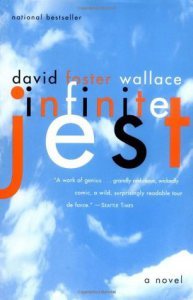Infinite Jest
Infinite Jest is nothing if not aptly titled: after reading nearly 100 pages it seems to me to be one huge joke.
I’d been wanting and meaning to read IJ for years, and the more I heard about the book and its author, the more I wanted to read it—but a thousand-something pages? I still haven’t finished War and Peace! Finally, after seeing The End of the Tour, I began.
In the first three chapters I found gems of wisdom buried in acres of verbiage, and was in serious need of guidance; I went to the Internet and found dozens, if not hundreds, of sites dedicated to IJ. I read a few reviews and reader discussions, scanned the Wiki site, and returned to reading. But now, fresh from laudatory reviews by people whose opinions I respect, and gushing declarations by fans and readers, my gut reaction was: You’ve got to be kidding! I mean, huge chunks of IJ are absolutely unreadable. The boredom, the repetition, the footnotes, many of them wholly unnecessary: was DFW putting us on?
Wallace committed suicide in 2008, 12 years after the fame and glory that followed IJ. I don’t know enough about the guy to speculate, but it’s safe to say there was some sort of mad genius going on in there. IJ is indeed a work of mad genius—so much so that I’m somewhat scared to admit my lack of enchantment. David Eggers, who wrote a somewhat negative and astute review of IJ when it came out, has hidden or somehow banished his review from the public; many years after IJ‘s outsized fame he wrote a foreword to the book that was purely positive, expressing the opinion that not a single sentence of IJ is imperfect, not a word out of place. Duck and cover, Eggers!
Thus, to ward off my fear of fans and laudatory literary luminaries who will surely attack my intelligence, or lack of same: for the record, my favorite author is Doris Lessing—no literary slouch—and I’ve slogged through, even delighted in, the works of Henry James, Thomas Mann, Fyodor Dostoevsky, and Edith Wharton, to name just a few who can be rough going.
Is Infinite Jest a work of infinite jest? Is it The Emperor’s New Clothes? No: the shame is, this probably could have been a much more accessible, readable, and therefore better novel. In the final analysis, Infinite Jest is a powerful testament to the utter absence of bold, intelligent editing in the publishing world today.
Filed under: books Tagged: Books, Literature





